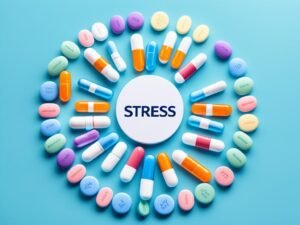Have you ever had a quick nosebleed and wondered if stress is to blame? There’s a strong link between stress and some health issues like headaches. But, does stress cause nosebleeds too? Let’s dive into understanding if there’s a real connection between them, what pretty much causes nosebleeds from stress, and how to deal with it.
A 2005 study showed that nosebleeds made up 1 in 200 emergency room visits in the U.S. The Anxiety and Depression Association of America suggests over 40 million American adults deal with anxiety disorders. This puts them at a greater chance of having nosebleeds often. Surprisingly, the study found that both young children and those over 65 are more likely to have nosebleeds too.
There’s not a lot of proof that stress alone causes nosebleeds. But, stress might lead to behaviors, health issues, and using certain medicines that can make you more likely to have nosebleeds. Understanding these links can help you manage if you’re getting nosebleeds because of stress. It also helps you find the right ways to stop or avoid them.
Key Takeaways
- Nosebleeds are a common occurrence in the U.S., with 1 in 200 emergency visits due to them.
- More than 40 million adults in the U.S. face anxiety disorders, increasing their risk of nosebleeds.
- Stress itself might not cause nosebleeds, but it can be connected to certain behaviors and health issues that do.
- Both young children and people over 65 are more likely to have nosebleeds.
- If nosebleeds happen often or are severe, you should see a doctor. This helps find the right treatment.
Understanding the Link Between Stress and Nosebleeds
Some people think stress and nosebleeds are closely linked. But, the connection may not be so direct. Stress and anxiety can lead to certain behaviors. These, in turn, can cause nosebleeds. For example, if you’re pregnant or do extreme sports, you might feel anxious. And this anxiety can lead to a nosebleed.
Limited Evidence Suggests Indirect Connection
We aren’t entirely sure if stress actually causes nosebleeds. The idea is that high blood pressure could be a reason. But again, this isn’t proven. Meds for high blood pressure might actually increase nosebleeds. High blood pressure itself might also make nosebleeds harder to stop.
Stress as a Contributing Factor
Stress isn’t the main reason for nosebleeds. But it can play a part. When we’re stressed, our body makes more cortisol. This can make the small blood vessels in our nose break and cause a nosebleed. However, stress combined with dry air or certain meds could make a nosebleed more likely.
Common Causes of Nosebleeds
Nosebleeds, or epistaxis, are quite common. About 1 in every 200 visits to U.S. emergency rooms is due to nosebleeds. Stress and anxiety can make nosebleeds more likely, but there are other known causes too.
Dry Nasal Passages
Dry nasal membranes are a big reason for nosebleeds. Winter air is often very dry. This can make the nose’s lining dry out and crack, causing nosebleeds. Drinking enough water and using a humidifier in your home can keep the air moist. This helps prevent nosebleeds.
Injuries and Irritations
Any hitting to the nose can cause a nosebleed. This might happen from an accident or even just from blowing or picking your nose too hard. Stress can lead to these behaviors. Allergies, infections, and things like smoke can also make the nose bleed by inflaming it.
Underlying Health Conditions
Worse health problems can also cause nosebleeds. Some say high blood pressure might be a cause, but others argue about this. Conditions like blood-clotting problems or nasal tumors might also be behind many severe nosebleeds.
Medications and Blood Thinners
Some drugs can make nosebleeds more likely. Blood thinners and aspirin, for example, make bleeding harder to stop. Medicines for high blood pressure might cause you to lose more blood if you have a nosebleed.
It’s good to know what can cause nosebleeds. This way, you can try to avoid them by managing your stress, avoiding certain medicines, or getting treatment for any health issues.
nosebleeds from stress
Stress doesn’t always cause nosebleeds, but it can help. When you feel stress, your body reacts. It goes into fight-or-flight mode and releases a hormone called cortisol.
Cortisol makes your blood vessels get smaller. This sends more blood to your muscles and brain. However, this might also make small nose blood vessels break, leading to a nosebleed.
How Stress Affects Blood Vessels
So, stress and cortisol might be why nosebleeds happen. Because cortisol makes tiny nose blood vessels break, you could see a nosebleed.
Identifying Stress-Related Nosebleeds
Do nosebleeds come when you are very anxious or stressed? Do they stop when you relax? This could show stress is causing your nosebleeds.
If you also have headaches or sleep troubles, stress might be a big part. This proves that stress could be a main cause of your nosebleeds.
Managing Nosebleeds in the Moment
If you get a nosebleed, there are simple steps to stop it. How to stop nosebleeds advice includes:
- Sit up straight. Tilt your head a bit forward to not swallow blood.
- Pinch your nose closed. Breathe through your mouth for 10-15 minutes.
- Use a cold compress on the bridge of your nose. This closes blood vessels.
- You can also try a nasal spray decongestant. It helps stop the bleeding.
Don’t blow your nose or put something inside. This could make it worse. If it keeps bleeding or it’s a lot, get nosebleed first aid help.
If your nosebleed comes with dizziness or problems breathing, take it seriously. You should see a doctor for nosebleeds right away then.
Preventing Stress-Induced Nosebleeds
While stress is not the direct cause of nosebleeds, it can play a part. Understanding how stress and nosebleeds are linked helps. You can take steps to stop stress nosebleeds.
Stress Management Techniques
Do things like yoga, deep breathing, and being mindful to cut stress. These activities lower your body’s stress levels. They can also keep you from getting nosebleeds linked to stress.
Staying Hydrated
Drinking enough water is important for preventing nosebleeds. Aim for several cups each day. This keeps your nose moist and healthy. Drying out and cracking can lead to nosebleeds.
Utilizing Humidifiers
A humidifier at home adds moisture to the air. It stops your nose from drying out. This is especially great in dry or cold weather. Lukewarm showers also help without drying your nose out.
Avoiding Nasal Irritants
Stay away from things that can irritate your nose. This includes tobacco smoke and dry air. Avoid too much nose blowing or picking, too. They can hurt the little blood vessels in your nose. This might lead to nosebleeds.
Use these tips to help prevent nosebleeds from stress. Keep stress down, drink water, and use a humidifier. Also, avoid things that can irritate your nose. If you get a lot of nosebleeds, talk to a doctor. They can check if there’s a deeper health issue.
Recurring Nosebleeds and Underlying Conditions
If you get recurring nosebleeds often, see a doctor. They might not be a big deal if they happen once in a while. But, if they happen a lot, it could mean something more serious, like a bleeding problem or a nasal tumor.
It is smart to keep up with your health checks if you have recurring nosebleeds. Don’t worry, doctors can help you figure out why this is happening. They’ll offer the best care for you.
| Potential Underlying Causes of Recurring Nosebleeds | Symptoms to Watch For |
|---|---|
|
|
Being watchful and talking to your doctor about recurring nosebleeds is crucial. They will work to find the cause and a way to treat it. This keeps you healthy and avoids more nosebleeds.
The Role of High Blood Pressure
Some people debate about high blood pressure and nosebleeds. But, new studies show a possible link. High blood pressure might let blood vessels break easier, leading to nosebleeds. Meds for high blood pressure, like blood thinners, could also make nosebleeds worse.
Hypertension and Nosebleeds
A study last year included 71,498 folks. It found those with high blood pressure have more nosebleeds. The American Heart Association says really high blood pressure is over 180 mmHg/120 mmHg. This might make nosebleeds happen more often in people with hypertension.
Medication Side Effects
Meds for high blood pressure can add to nosebleeds too. For example, blood thinners can make nosebleeds trickier to stop. So, even if high blood pressure isn’t the direct reason for the nosebleed, controlling the bleeding can be tough for those affected.
Seeking Professional Medical Advice
If you get frequent or severe nosebleeds, seeking help from a professional medical expert is key. Minor nosebleeds might not worry you. But, recurring or excessive ones might signal a health problem. Your doctor can pinpoint the main reason for your nosebleeds. Then, they can suggest how to treat or manage them.
The first and third sources stress talking to a doctor about nosebleeds that keep happening. Seeing your doctor means you can get the right help and advice. They can either keep an eye on it or start treatment. If nosebleeds cause trouble or worry you often, don’t wait to see a doctor.
Going to a professional medical expert means getting to the bottom of why you’re having nosebleeds. Handling any health issues found can reduce the chances of nosebleeds happening again. This is not only about stopping nosebleeds. It’s also about taking care of your breathing health.
Conclusion
Stress doesn’t directly cause nosebleeds, but it can make them more likely. Stress and anxiety might cause you to do things that could lead to nosebleeds. This includes using certain medicines and facing health issues.
Managing stress, staying hydrated, and avoiding irritants can lower the risk. If you’re getting lots of nosebleeds, see a doctor right away. They can check for any serious health problems.
Summing up, stress can’t cause nosebleeds on its own. But, it can make other risks for nosebleeds higher. By handling stress and being careful, you can avoid nosebleeds from stress and anxiety.
So, it’s key to stay healthy overall and see a doctor when needed. This advice helps with both stress-related nosebleeds and others. Knowing stress can play a part, make good choices for your health.




